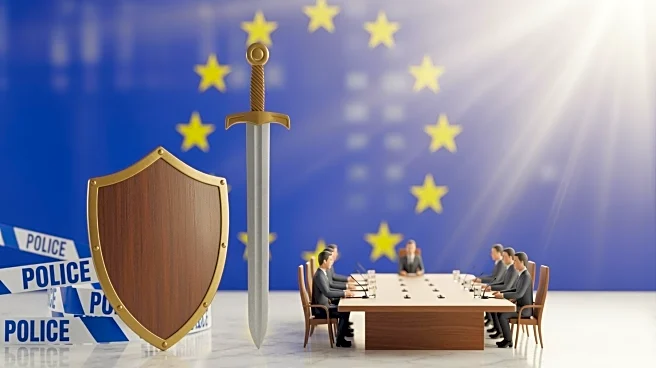What's Happening?
European Union leaders are currently debating whether to attach conditions to a proposed €140 billion loan intended for Ukraine's defense needs. The loan, which would be financed using frozen Russian assets, is meant to support Ukraine in its ongoing
conflict with Russia. However, there is disagreement among EU member states about whether the funds should be restricted to purchasing European-made weapons or if Ukraine should have the freedom to buy from U.S. manufacturers. France, Germany, and Italy are advocating for a 'Buy European clause' to bolster the EU's defense industry, while countries like the Netherlands and Nordic states argue for allowing Ukraine to choose its suppliers freely. The issue is expected to be a focal point at an upcoming EU leaders' summit in Brussels.
Why It's Important?
The decision on the loan conditions is significant as it could impact the dynamics of the defense industry within the EU and its relationship with the U.S. If the 'Buy European clause' is implemented, it could strengthen the EU's defense sector but may limit Ukraine's access to certain advanced U.S. weaponry, potentially affecting its military capabilities. Conversely, allowing Ukraine to purchase U.S. weapons could enhance its defense against Russian aggression but might not contribute to the EU's strategic goal of reinforcing its own defense industry. The outcome of this debate could also influence EU-U.S. relations and set a precedent for future defense funding and cooperation.
What's Next?
The EU leaders' summit in Brussels will be crucial in determining the final decision on the loan conditions. The summit's conclusions could lead to a legal proposal from the European Commission outlining the specifics of the loan. The decision will likely prompt reactions from major stakeholders, including defense manufacturers in both the EU and the U.S., as well as political leaders in Ukraine who are keen on securing the best possible support for their defense needs.
Beyond the Headlines
The debate over the loan conditions highlights broader issues of sovereignty and strategic autonomy within the EU. It reflects ongoing tensions between member states' desires to support Ukraine and their interests in strengthening the EU's defense capabilities. The decision could also have long-term implications for the EU's role in global security and its ability to act independently of U.S. influence.















